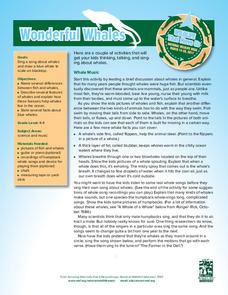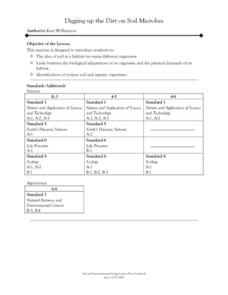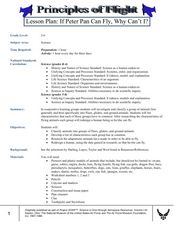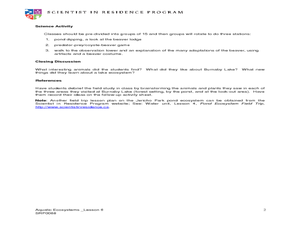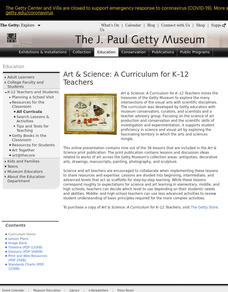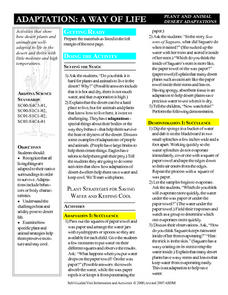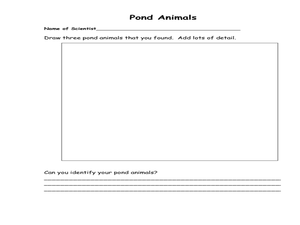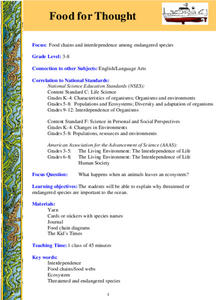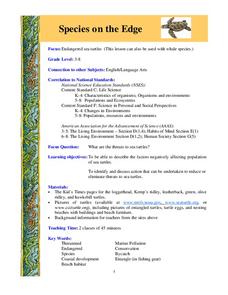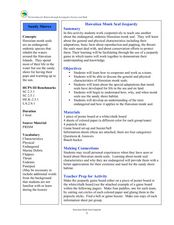Curated OER
Sorting Things Out
Written to examine seeds that grow in Kansas, you can adapt this lesson to anywhere you live. Learners sort a mixture of five different seeds to by any characteristic of their choice. When your budding scientists are exploring the life...
Curated OER
Wonderful Whales
Primary marine biologists consider the largest living animals on Earth, the whales. Introduce them to general anatomy, unique adaptations, and behaviors. Teach them to sing a song that will help them remember some of these facts....
Curated OER
Digging up the Dirt on Soil Microbes
Students are introduced to the idea of soil as a habitat for many different organisms. They are introduced to the links between the biological adaptations of an organism and the physical demands of its habitat. Pupils are introduced to...
Curated OER
Aquatic Ecosystems
Students study the diversity of marine life and their habitats. For this aquatic ecosystems lesson students complete a lab activity and experiment.
Curated OER
Life on the Surface of the Earth
Students discover that life occurs on or near the surface of the Earth in land, air, and water. They read the literature selection, 'Whose Forest Is It?'
and discuss with students that there are examples of of many living things
that...
Curated OER
Disguise for the Eyes
Young scientists discover how many, many animals use color as a way of helping them to survive in the wild. They understand how animals use color in their everyday lives. Pupils engage in hands-on activities, watch videos, access...
Curated OER
Penguins Around the World
Students investigate penguins. In this Science lesson, students compare and contrast penguins to flying birds. Students use a Venn diagram to illustrate the differences and similarities of penguins and flying birds.
Curated OER
Adaptations
Young scholars identify what adaptation is and to research a specific mollusk. They also identify and interpret how animals get their common and scientific name and why it is Latin. Finally, students draw their shell (mollusk) and name...
Curated OER
If Peter Pan Can Fly, Why Can't I?
Young scholars redesign a human, using data in research, so that s/he can fly. In this flying lesson, students examine the characteristics and adaptations of groups of animals that can fly. Using this research, young scholars work...
Curated OER
Burnaby Lake Field Trip
Learners identify different organisms found in the lake ecosystem. In this life science instructional activity, students discover the predator-prey relationship through a game. They explain how beavers adapt to the environment over time.
Curated OER
Adaptable Mandibles
Students define adaptation and highlight example of adaptation in birds and other animals. They study feeding techniques of seabirds and investigate the effect that trash has on wildlife.
Curated OER
Bird Bodies
Students read about and explore the different types of birds. They discuss how all birds are alike and what makes some different from the others. They experiment picking up "food items" using different tools that represent different...
Curated OER
Clearly Classified
Young scholars review the classification system for living organisms and apply it the classification of insects and flowers in the still life by Ambrosius Bosschaert. They create a chart classifying the animals and plants in the painting...
Curated OER
Learning From Leaves: Adaptations To Differing Light Levels
Students, in groups, examine plants with different light levels. They are given plants from a tropical and desert region. They write a hypothesis at the beginning of the experiment.
Curated OER
Desert Habitat
Students examine how desert plants and animals are adapted to life in the desert. They listen to the book, "Seasons of Saguaro," conduct experiments to demonstrate plant succulence, and create and draw an animal or plant that...
Curated OER
Pond and Pond Organisms
Students explore pond ecosystems. In this pond organism activity, students will use pond water and a plastic bad in order to locate and identify freshwater organisms. The activity is designed for younger grades, but...
Curated OER
Marine Field Trip to Whytecliff Park
Pupils study the intertidal habitat, tidal pools and the organisms that live in them. In this aquatic ecosystems instructional activity students take a field trip and experience first hand the local seashore environment.
Curated OER
Food for Thought
Students explore the food chains in a variety of ecosystems and its relationship to the survival of threatened or endangered marine animals or fish in the ocean. The interdependence of the species is investigated in this lesson.
Curated OER
Species on the Edge
Students study science. In this endangered species lesson plan, students examine sea turtles and actions that can be taken to help keep them alive. They work in small groups to research different species of turtles and share their...
Curated OER
Hawaiian Monk Seal Jeopardy
Learners explore the Hawaiian monk seal. In this science instructional activity, students read about the monk seal and participate in a game in which they answer questions about the Hawaiian monk seal.
Curated OER
Termitology
Learners engage in an inquiry-based study of the ecology of termites. Through hands-on investigations, they explore the life cycle of termites, the termite's role in the food web, and the unique social structure of termite colonies.
Curated OER
Pond Exploration
Pupils take a hands-on approach to explore the world beneath the water in this activity. They examine the creatures they catch to study about the adaptations these animals have that allow them to survive in this harsh environment. They...
Curated OER
Characteristics of Snakes and Turtles
Students examine the characteristics of snakes and turtles and compare/contrast reptiles with mammals. They watch a video, answer discussion questions, complete information charts, conduct Internet research, and create a habitat diorama.
Curated OER
Pet Detective WebQuest
Students take an online tour to learn about pets and their care. They click on selected Web links and answer questions about the material they encounter. They share something they learned from the WebQuest with a partner.

